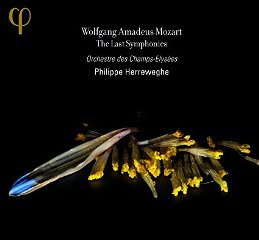Mozart – The Last Symphonies (2013)
Mozart – The Last Symphonies (2013)

CD 01 Symphony No. 41 in C major, K.551, 'Jupiter' 01. Allegro vivace 02. Andante cantabile 03. Menuetto (Allegretto) & Trio 04. Molto allegro CD 02 Symphony No. 39 in E flat major, K.543 01. Adagio - Allegro 02. Andante con moto 03. Menuetto (Allegretto) & Trio 04. Finale. Allegro Symphony No. 40 in G minor, K.550 05. Molto allegro 06. Andante 07. Menuetto (Allegretto) & Trio 08. Allegro assai Orchestre des Champs-Elysees Philipp Herreweghe - conductor
Mozart's last three symphonies carry within them the aesthetic ideal of their composer. Orchestre des Champs-Elysees, using period-instruments, reveals the richness and visionary complexity that prepared the way for the Beethovenian revolution. Led by Philippe Herreweghe, the orchestra explores the sonority and motor rhythms of Mozart's symphonic writing at the height of his powers. --- Editorial Reviews, amazon.com
The qualification “late” or “last” in reference to a musical work often elicits a very specific type of reaction, one which usually assumes a profundity of intent or an inherent tragic content—as if a composer, especially one so young as Mozart, was aware that the last symphonies, piano concertos, or operas which he composed were in fact to be his very final statements in those genres. What is perhaps important to keep in mind when listening to or performing these works is how one can understand them as products of their age rather than just last testaments: not only did Mozart in these works summarize many aspects in the history of the genre, he also added to the genre which was yet to come, the one which Beethoven was to take up just a few years later for the first time, and in a sense bring to its culmination for the generations which followed. So the real question, when approaching these important works either in the concert hall or in the recording studio, is: how should one go about performing them without the insight, which is an inherent part of our musical knowledge, as to what was yet to happen?
One should perform them as does Philippe Herreweghe and his Orchestre des Champs-Élysées do here: one should be aware of their individual characteristics—the grand disposition of No. 39, the gloomy and always searching one of No. 40, and the jubilant and triumphant one of No. 41, the “Jupiter”—and look to bring these out as much as possible, always keeping in mind the extent to which these symphonies sounded to the audiences of Mozart’s age and to those of the following generation. Herreweghe’s magic is that he brings out those individual qualities of the works, while paying special attention to the characteristics not only of Mozart’s time, but of Mozart’s other music. The opening of No. 40—performed at a brisk tempo reflective of the composer’s marking: Allegro molto —is a perfect example: not only is it dramatic in effect, sounding like something ripped right out of Don Giovanni , it maintains a certain sense of suaveness and grace to it. This is no light-hearted music, yet it is also not the quasi-heroic music of a pre-Beethoven. Mozart needs no justification for being Mozart. Herreweghe is also especially careful in terms of orchestral balance. The beautiful Andante cantabile in the “Jupiter” Symphony provides a perfect example: some 33 seconds into the movement, the moment in which the flutes and bassoons double the first violins is so well weighed that each individual instrument can be heard equally well—no small feat when one considers the normal blending of such passages. Careful attention is also paid to tone color; it is equally as vivid as balance in these performances: some few measures after the aforementioned wind passage, after the pronounced f in the lower strings, the violins’ 30-second note answer shimmers in its effect, transporting the listener to a world unknown. It is as a heavenly sigh relieving one of the stress of life. Perhaps my least favorite moment comes in the Finale to the “Jupiter.” Rather than sounding like a natural grand culmination at its end, the effect of the fugato section (which forms the coda) sounds a bit too forced for my taste. Here I prefer Ton Koopman and the Amsterdam Baroque Orchestra’s live recording (on Apex 0927490452), with their more natural approach: mysterious at its opening, working its way through a jumble of different motives which here come together to form one of the sunniest and most complex contrapuntal passages, only to finally give way to a simple homophonic ending. Everything in their hands just sounds inevitable.
Other than my minor quibble, and though one may not want to be without one’s other favorite recordings of these works, Herreweghe’s versions can stand up with the best of them, whether one prefers period performance practices or the more modern versions of many of the greats of the last century from Bernstein to Karajan to Böhm. Excellent and informative program notes by the Mozart scholar Neal Zaslaw round out a marvelously produced and recorded recital. If I had to complain about one further aspect, it would be the meager timing at the mid-level selling price: why record a double disc set including “The Last Symphonies” which barely adds up to 100 minutes of music? That’s less than 50 minutes average per disc. One other late work—the Clarinet Concerto, the 27th Piano Concerto—would have rounded out this recital nicely. But for that, my other complaints are minimal. ---FANFARE: Scott Noriega, arkivmusic.com
download (mp3 @320 kbs):








